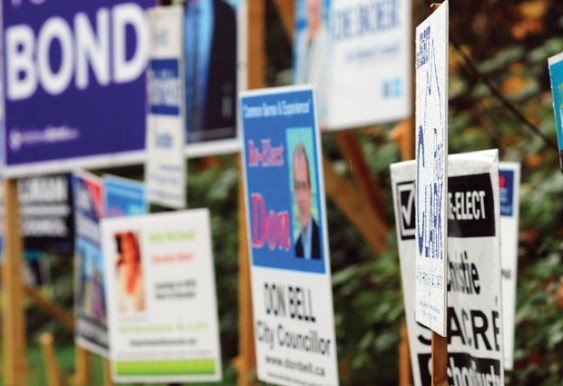The cost of a seat on municipal council ought to be cheaper in the 2018 elections, as the province has moved to limit campaign spending.
Community, Sport and Cultural Development Minister Peter Fassbender has introduced legislation that would limit how much candidates can spend based on the size of the municipality’s population.
Under the formula, mayoral challengers will be limited to $1 per capita for the first 15,000 population and 55 cents per capita for the next 15,000 to 150,000. For council candidates, the limit is 50 cents per capita for the first 15,000 population and 28 cents for the next 15,000 to 150,000 population.
The spending limits apply to any costs incurred starting on Jan. 1 of election year and the province will use the latest population estimates from BC Stats to determine the exact allowable expenses in each campaign.
Had these limits been in place for the 2014 municipal elections, a swath of candidates on the North Shore would have overspent the limit – in some cases by a factor of three.
The City of North Vancouver will likely see the most drastic changes under the new system. Using 2014’s estimated population of the City of North Vancouver of 52,346, mayoral candidates would have been limited to $35,540.30 and council candidates, $17,956.88.
Mayor Darrell Mussatto’s 2014 election expenses came in at $96,702.41 while his competitor Kerry Morris spent $79,226.52.
Two of the five council members will also have to strategize for cheaper campaigns if they plan to run again in 2015, including Coun. Craig Keating who topped spending at $28,911.19 and Coun. Linda Buchanan who came in at $27,592.07.
The District of West Vancouver’s limits, meanwhile, would fall somewhere around $29,915.45 for mayoral candidates and $15,093.32 for council candidates, using the 2014 population of 42,119.
Mayor Michael Smith would be well under that limit with his $0 campaign budget but council veterans Mary-Ann Booth and Michael Lewis would have to rein in their spending, which came in at $22,357.90 and $15,853.14 respectively.
In the District of North Vancouver, with a population of 86,623, 2014 mayoral candidates would have been limited to $54,392.65 and would-be councillors, $27,554.44. District Mayor Richard Walton ran unopposed and spent only $2,877.01. The only council member who would have breached the limit is Jim Hanson who spent $28,307.58.
The changes are welcomed by Dermod Travis, executive director of Integrity BC a non-profit that lobbies to make government more transparent and accountable.
“By and large, they’ve hit a limit that is fair, that allows any perspective candidate to say ‘I can be competitive in this race,’” Travis said. “What we’ve had before, without limits, is a situation where many candidates will simply opt out because there are no limits and they know they’re going to be outspent, in some cases, by 10 to one.”
These limits put B.C. somewhere in the middle of the pack for spending limits, across Canada. Still, Travis and Integrity BC have plenty of criticism for what the province has failed to include in legislation – limits on the size of campaign donations and an outright ban on corporate and union donations.
“When you look at the situation in B.C., you still see companies that are contributing tens of thousands or hundreds of thousands of dollars, in some cases to political candidates who are running for local office – companies that also have business in front of many of those local councils. You see it in North Vancouver,” he said.
Whether that amounts to a real conflict of interest or not, it contributes to the growing cynicism the public has around politics, Travis said, and it gives undue influence on the outcome of elections.
“I think we have to get big money out of politics altogether whether it’s at the local or provincial level,” he said.
The Ministry of Community, Sport and Cultural Development is accepting public comment on the proposed legislation until Nov. 27.



